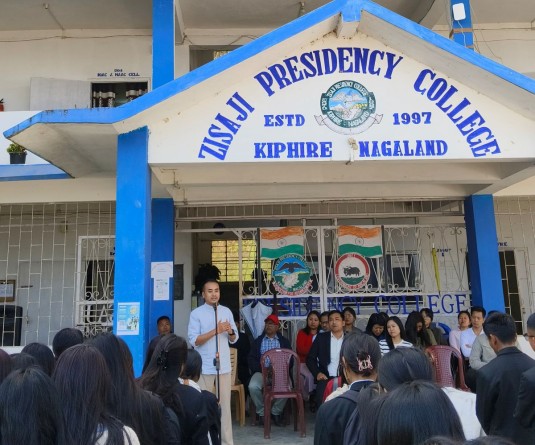Map of Dzüko and Kozürü area as provided by the Mao Council.

Claims it does not adhere to Tenyimi customary laws and traditional practices
SENAPATI, JULY 20 (MExN): In a new development, the Mao Council rejected the Tenyimi Peoples’ Organisation (TPO) presidential council verdict of July 12 on the land dispute at Kozürü/Kezoltsa/Kazing while maintaining that it did not adhere to the fundamental principles of Tenyimi customary laws and traditional practices.
According to a representation addressed to the TPO president dated July 19, a copy of which was furnished to The Morung Express, the MC said the TPO is bound by the ‘Arbitration Undertaking’ dated November 28, 2017 which stipulates “Naga Customary Laws and its usages (Tenyimi),” as it was decided to review the case on the basis of this very undertaking. It said the TPO is also mandated by the foundational basis of common ancestry, culture and traditional customs of the Tenyimi tribe to settle the dispute under customary laws and traditional usage of the Tenyimis.
It stated that as per SAPO letter of February 13, 2023 to the TPO rejecting the December 19, 2022 verdict on ground of disregard of Tenyimi traditional laws and usages, request was made for review of the verdict with “oath taking.” Likewise, the MC also rejected the TPO/BOA December 19, 2022 verdict stating that it would not be able to abide by the same as it was without the basis of Naga (Tenyimi) customary law and practice.
In spite of the clear and declare position and prior option for oath taking by the original two contestants viz Mao Council and SAPO, the MC stated that the July 12, 2024 judgment has once again willfully disregarded this vital aspect, raising serious question on the reason for doing so.
Underlining the cornerstone of their claim, the MC cited an oath taken around 130-135 years back by one Neni Kopfujü before the four khels of Viswema on behalf of Maos (Punanamei and Pudunamei) pronouncing the landmarks of Mitotsü, Khjongho, Isü phi, Mizudo Kosü and Isü Bikono as the boundary. This boundary line demarcates the southern end of Viswema land with agreement that tress cut on the said landmark ridges which falls on Mao side would be theirs and vice-versa, it said.
On the other hand, the pronounced landmarks stand as the northern boundary of Maos which includes Kozüri, Isü Mountain and Mao Dzüko. Neni Kopfujü’s oath was taken on the paddy field located about 300 meters from Nagaland Police Khuzama check post and near the National Highway bridge over the stream that down from Mitotsü, the MC claimed.
It asserted that the oral history of the oath has been passed down over 4 generations and there was no dispute on the sworn boundaries till 1985 when the portion of Dzüko was made a matter of dispute. It also stated that Kozürü forest dispute began in 2000 when a rest house was constructed by Viswema in Kozürü purportedly to mark Viswema’s land boundary.
The MC, therefore, alleged that SAPO’s present claim over Mao Dzüko valley and Kozürü has gone beyond the sworn boundary landmarks. It said Isü Mountain on whose western hill side lies Mao Dzükou valley and straddled on the east by Kozürü/Kezoltsa/Kazing, has been apportioned to SAPO by the present judgment although it is within the Mao side of the boundary pronounced by ancestor Neni Kopfujü.
While stating that to the Tenyimis, an oath cannot be taken lightly and held in disrespect by all concerned, the MC emphasized that this entails vouching of the fate and lives of that time and that of their descendants. To bypass/surrender or undo such solemn oath is a taboo for the Mao people. If the integrity of Neni Kopfujü’s oath is questioned, the Mao people are ready to defend its truth and veracity by traditional oath, it stated.
The MC also highlighted the ruling of the imperial Darbar in 1933 and the reaffirmation of the 1995 in the south boundary of Kozürü.
It further stated that the order no-11 of July 12 judgment, stipulating that it shall be ‘final and binding on all the parties’ is not a Tenyimi traditional practice and especially so when solemn oath taking and traditional parking of meat to celebrate affirmation of standing settlement are discounted and ignored by the judgment.
It also countered order no-10 describing the judgment as based on customs and traditions of the Tenyimi people- the settlement of disputes as per the traditions and customs passed on down the generations necessarily culminates in oath taking when the parties are not satisfied with the proposals of the elders for resolution of dispute.





